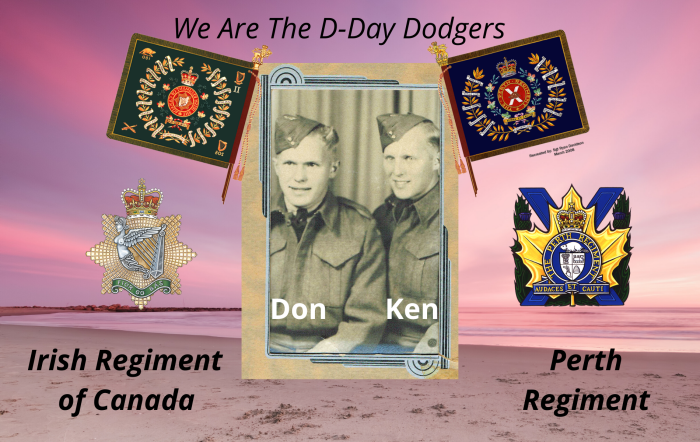Story behind the ballad and the history it tells us.

On July 10, 1943, Canadian troops landed in Sicily. It was the start of the Italian Campaign. Allied troops including the Canadians would take Sicily and then Italy from the Germans. It would be some of the fiercest fighting of WWII before ending by spring 1945. They transferred Canadian troops to Northwest Europe in February 1945.
My dad and his brother, Ken, both landed in Italy as part of the 11th Infantry Brigade, 5th Canadian Armoured Division. Ken landed November 8, 1943 with the Perth Regiment. Dad landed with the Irish Regiment of Canada on November 10, 1943.
Ken was seriously wounded in January 1944. He would spend the rest of the war recovering from his wounds, which almost saw his hand amputated. Dad and his unit would fight their way up through Italy against some well dug in, crack German troops. Ground was hard fought for, literally taken street by street sometimes. He was with the troops transferred to Northwest Europe.
Proud of the D-Day Dodger Moniker
Dad often proudly told me he was a ‘D-Day Dodger’ and then would tell me the story of why he was so proud to be one. He wasn’t alone.
The Italian campaign received very little attention. The Allied landings at Normandy in June 1944 took even more attention away from the long, hard, bloody battle in Italy. The fighting in Italy tied down troops the German’s could have used to reinforce their troops in France. One campaign supported the other.
As the fighting wore on the troops felt forgotten. Then a rumour made its way through the ranks. They claimed British aristocrat Lady Astor had called the guys in Italy D-Day Dodgers. The implication being the troops had it easy while the real fighters were busy in France. There were 92,000 Canadians fighting in Italy, 21,000 wounded and 5,300 killed.
Who Was Lady Astor?
Lady Astor was the second woman elected to the British Parliament, but the first to take her seat in the House. She was an American-born divorcee married to an American born British aristocrat. Lady Astor was known for an acid tongue and her anti-Semitic, anti-Catholic, anti-communist and pro-Nazi attitudes. She leaned toward the Nazis because she believed they had the solution to her anti-Semitic beliefs.
Legend has it she sparred regularly with Winston Churchill. His drinking offending her teetotaller sensibilities. One reported exchange involved her telling Churchill if he was her husband she would poison him. He was said to have responded if he was her husband, he would drink it.
How the Ballad Was Born
There are no records to show those exchanges between them ever happened. Nor is there any record of her having called the troops in Italy ‘D-Day Dodgers’. What are a bunch of tired, war-weary and somewhat bitter troops to do with such a rumour? Well, spread it around until someone creates a song.
Sung to the tune of a popular German love song “Lili Marleen”, it soon became very popular among the troops. Variations were written for different troops. Like any ballad, it tells the story of the Italian Campaign tinged with sarcasm. Let’s explore the Canadian version.
The Ballad of the D-Day Dodgers
We’re the D-Day Dodgers out in Italy –
Always on the vino, always on the spree.
Eighth Army scroungers and their tanks
The ‘vino’ is wine referring to the troops always drinking.
The Eighth Army was a British Army formation made up of Commonwealth troops under the command of British officers, most notably Field Marshall Bernard Montgomery.
*We live in Rome – among the Yanks.
We are the D-Day Dodgers, over here in Italy.
We landed at Pachino, a holiday with pay
Jerry brought a band out, to cheer us on our way*
Pachino was an airfield on the island of Sicily the Canadians captured along with 500 Italians. “Jerry” refers to the German army. The invasion of Sicily lead to the overthrow of the Italian dictator Mussolini and the Germans immediately seized control.
Showed us the sights, and gave us tea
We all sang songs, the beer was free
We kissed all the girls in Napoli.
The Canadians landed in Italy and advanced on Naples, where they received little resistance as the Germans had pulled back to establish a line of defence across the narrow part of the boot.
Moving north from Naples was another story. The German lines were well protected with machine-gun nests, barbed wire, land mines and artillery positions. The troops had a painstaking crawl on poor roads and bad late fall weather.
For we are the D-Day Dodgers, over here in Italy.
The Moro and Ortona were taken in our stride
We didn’t have to fight there. We just went for the ride.
The Canadians along with the Allied troops had been fighting their way inland for weeks. In early December they launched an assault on the Moro River defences. One unit made headway and then were ordered back. A bridgehead was established but terrain blocked further advancement.
Repeated frontal assaults weakened the German hold until the Canadians halted a full on assault again in mid-December, driving the Germans into Ortona.
During Christmas 1943 they engaged in the battle of Ortona, an ancient town on a ledge overlooking the Adriatic Sea. It was a week of vicious street to street fighting, smashing their way through buildings to advance.
December had started with a troop strength of about 20,000. By the time Ortona was liberated, 500 Canadians had died, 2,100 wounded, 3,956 evacuated for battle exhaustion and 1,617 sick. They had achieved their objective at a heavy cost.
Anzio and Sangro were all forlorn.
We did not do a thing from dusk to dawn.
For we are the D-Day Dodgers, over here in Italy.
By mid-January 1944 the Canadians were taking part in the US lead Battle of Anzio. On the night of January 17th, Canadians attempted a crossing of the Arielli River and were repulsed. There were 185 casualties.
Among them, my uncle Ken. Thanks to a young doctor newly arrived at the casualty station, his hand was saved from amputation. He’d been shot seven times, one of them through his forearm.
Sangro was part of the Winter Line, a series of defensive lines of military fortifications built by the Italians and the Germans. They were designed to defend a western section of Italy. The Gustav line ran across Italy from just north of the Garigliano River to the Sangro River on the Adriatic coast. The line slowed the Allied advance until June 1944.
By the time the Allies landed in Normandy in June 1944, the Canadians in Italy had broken through the Gustav Line and then the Hitler line. Fighting against fierce resistance they pushed up through the Lira Valley toward Rome which was captured by June 4th, two days before D-Day.
The three weeks of intense fighting had exacted a steep toll on the Canadian Corps. There were 800 dead, 2,500 wounded, 4,000 sick and 400 suffering from battle exhaustion. The D-Day Dodgers had much to be proud of.
On our way to Florence we had a lovely time.
We ran a bus to Rimini right through the Gothic Line
On to Bologna we did go.
The attention may have shifted to France, but there was still much further to go in Italy to wrest the country from German control. The Gothic Line was the last line of defence for the Germans. The Germans had used slave labour to create 2,000 well fortified machine-gun nests, gun emplacements, bunkers, observation posts and artillery fighting positions. It would take a formidable effort to break it.
The Battle of Rimini near the Adriatic coast took place as part of Operation Olive to break the Gothic Line. It was one of the toughest battles the Canadian Corps had fought as they sought to open a breach to let the 5th Armoured Division pass through. By the time that was accomplished there had been another 4,511 Canadian casualties, including 1,016 dead.
Near Savio, Italy on October 21 to 22, Private Ernest (Smokey) Smith became the only Private to earn a Victoria Cross. The citation tells the story of him leading his anti-tank group to a defensive position to repel three German tanks, two self-propelled guns and thirty infantry trying to counter-attack. Coming face to face with a tank, Smith held his ground. When the tank reached ten meters from him, he opened fire and disabled it. He and his men then forced the Germans to withdraw.
My dad told me his unit came through the area the following day. They had heard the story of what Smith had done. Dad told me there was no defensive position to be had. It was wide open ground. They hunkered down, dug in and hoped for the best. Pure, raw, courage.
Then we went bathing in the Po.
For we are the D-Day Dodgers, over here in Italy.
Once we had a blue light that we were going home
Back to dear old Canada, never more to roam.
Then somebody said in France you’ll fight.
We said never mind, we’ll just sit tight,
The windy D-Day Dodgers, out in Sunny Italy.
Now Lady Astor, get a load of this.
Don’t stand up on a platform and talk a load of piss.
You’re the nation’s sweetheart, the nation’s pride
But we think your bloody big mouth is far too wide.
For we are the D-Day Dodgers, out in Sunny Italy.
When you look ’round the mountains, through the mud and rain
You’ll find the scattered crosses, some which bear no name.
Heartbreak, and toil and suffering gone
The boys beneath them slumber on
They were the D-Day Dodgers, who’ll stay in Italy.
The fighting had left Canadian war dead across the country. Today there are twenty war cemeteries where they’re buried. Engraved on a monument in the Cassino cemetery are the names of 192 Canadians who have no known grave in Italy.
*So listen all you people, over land and foam
Even though we’ve parted, our hearts are close to home.
When we return we hope you’ll say
“You did your little bit, though far away
All of the D-Day Dodgers, way out there in Italy.” *
Understanding the courage and the sacrifices which had gone into the Italian Campaign, I think you can understand the sarcastic tone of the ballad and the pride those who served in the Italian Campaign take in their efforts. This ballad has only touched on a portion of the total campaign.
The ballad was one of the songs at my dad’s Celebration of Life. Here’s a rendition of it.
**We will remember them. **
SOURCES:
The Perth Regiment
Irish Regiment of Canada
The inspiring but inconvenient truth of Nancy Astor's legacy
The Italian Campaign
Canada — Italy 1943 - 1945
Ernest Alvia Smith
Veterans Affairs — Memorials in Italy
Wikipedia — D-Day Dodgers
Wikipedia — Nancy Astor

Shadowspub is a writer from Ontario, Canada. She writes on a variety of subjects as she pursues her passion for learning. She also writes on other platforms.

She created Prompt A Day to share with others. You can subscribe to Prompt A Day for a set of ideas in your inbox every day
I do love history. Thank you for sharing some of the Canadian History of World War II. Pretty neat song as well!